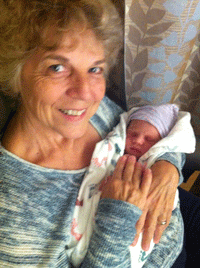Infant/Toddler Care
Infants, especially, need a loving connection to another primary caregiver when they are away from their parents. The infant-parent bond is unique and is not diminished by the bonds a child forms with other caregivers. The time infants spend away from their parents serves them best when a knowledgeable and loving caregiver is responsive to their many nuances of communication and can interact with them with genuine warmth and enthusiasm. Continuity of caregivers provides the best foundation for children’s healthy emotional and intellectual development.
 Infant care has an emphasis on promoting healthy sensory integration, thus encouraging natural developmental phases. Based upon the research of Hungarian physician Emmi Pikler, the movement of infants and toddlers needs to be as unrestricted as possible. To encourage rolling over, sitting up, crawling, and pulling up through their own capacity, infants are not placed in walkers, bouncers or mechanical devices. Before mobility, they are frequently placed on natural-fiber blankets or rugs in a protected space with a few simple toys to allow freedom of exploration. When they begin rolling and crawling, they are allowed to explore the larger environment. The youngest infants are also carefully wrapped for sleeping to provide a healthy sense of security and warmth, and caps are provided to protect their sensitive heads and ears.
Infant care has an emphasis on promoting healthy sensory integration, thus encouraging natural developmental phases. Based upon the research of Hungarian physician Emmi Pikler, the movement of infants and toddlers needs to be as unrestricted as possible. To encourage rolling over, sitting up, crawling, and pulling up through their own capacity, infants are not placed in walkers, bouncers or mechanical devices. Before mobility, they are frequently placed on natural-fiber blankets or rugs in a protected space with a few simple toys to allow freedom of exploration. When they begin rolling and crawling, they are allowed to explore the larger environment. The youngest infants are also carefully wrapped for sleeping to provide a healthy sense of security and warmth, and caps are provided to protect their sensitive heads and ears.- Nursing mothers are encouraged to come anytime they wish to nurse and/or to leave expressed milk with the child’s caregiver. Bottle-fed babies are held while feeding.
- Rocking and cuddling will be encouraged to develop a healthy sense of touch and movement and to promote security and comfort. They may be sung to while going to sleep. Depending upon the nature of the infant, some may be rocked to sleep, while others may fall asleep in the crib or pram.
- Toddlers are given ample opportunity for explorative movement and developing their sense of balance. The environment provides a variety of gradations and safe climbing opportunities.
- Diaper-changing will be considered a special time for connecting with the caregiver and may include a special name song created for each baby or a simple nursery rhyme, and a gentle massage. Through the interaction with the caregiver, the baby will be encouraged to be active in clothing herself or himself; for example, by learning to lift its own bottom for diapering or pulling on its own socks when capable.
- Toilet training is paced according to the individual child, but generally begins around two years old. Parents and caregivers work out a compatible routine.
- Music and basic finger and foot games are a daily experience.
- Clear, articulate speech is expected of the caregivers who are also encouraged to speak frequently to the infants throughout the day. This is the time in the child’s life when the development of speech capacities is at the forefront.
- Outdoor time is a daily experience except in the most inclement weather. A protected area is provided for crawlers and infants. Infants who fall asleep outside can remain outside, snuggly wrapped and covered in a buggy, until time to go in. Fresh air provides a deep, more restful sleep.